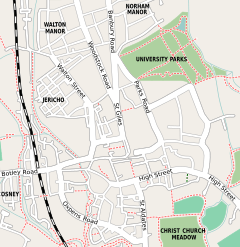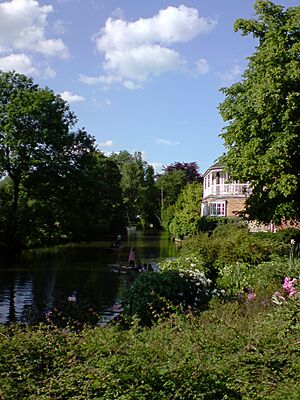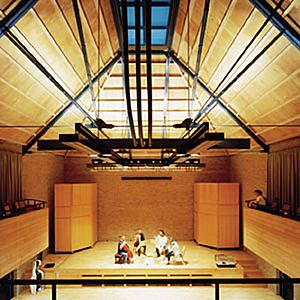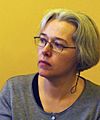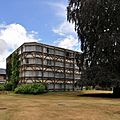St Hilda's College, Oxford facts for kids
Quick facts for kids St Hilda's College |
||||||||||
|---|---|---|---|---|---|---|---|---|---|---|
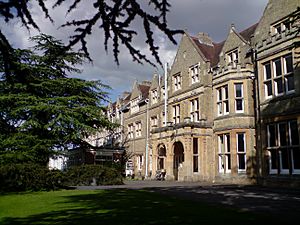
South Building
|
||||||||||
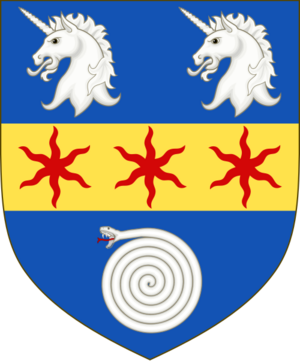
Blazon: Azure, on a fess or three estoiles gules in chief two unicorns' heads couped, in base a coiled serpent argent.
|
||||||||||
|
|
||||||||||
| University | University of Oxford | |||||||||
| Location | Cowley Place | |||||||||
| Coordinates | 51°44′57″N 1°14′43″W / 51.749162°N 1.245334°W | |||||||||
| Latin name | Collegium Sanctae Hildae | |||||||||
| Motto | non frustra vixi (I lived not in vain) | |||||||||
| Established | 1893 | |||||||||
| Named for | Hilda of Whitby | |||||||||
| Principal | Professor Sarah Springman | |||||||||
| Undergraduates | 400 (2011/2012) | |||||||||
| Postgraduates | 175 | |||||||||
| Major events | St Hilda's College Ball | |||||||||
| Map | ||||||||||
St Hilda's College is one of the many colleges that make up the famous University of Oxford in England. It is named after Hilda of Whitby, an important Anglo-Saxon saint. The college started in 1893 as a place just for women.
For a long time, St Hilda's was a college only for women. It was the very last college at Oxford to become mixed-gender. This happened in 2008. Now, the college has almost the same number of young men and women studying there.
The head of the college is called the Principal. Currently, Professor Sarah Springman is the Principal. She started this role in 2022.
Contents
History of St Hilda's College
St Hilda's College was started in 1893 by Dorothea Beale. She was also a headmistress at another school called Cheltenham Ladies' College. When it first opened, it was called St Hilda's Hall.
At first, St Hilda's was only for women students. It stayed that way for many years. Other colleges at Oxford slowly started to accept both men and women. But St Hilda's remained a women's college until 2008.
In 2006, the college leaders voted to allow both men and women to study there. This was a big change! In October 2007, the college got special permission to make this change. Then, in 2008, the first male students joined St Hilda's. Today, the college has a mix of male and female students.
Women's Rowing History
St Hilda's College made history in sports too! It was the first college for women in Oxford and Cambridge to have a women's rowing team. This happened way back in 1911.
A student from St Hilda's, H.G. Wanklyn, helped create the Oxford University Women's Boat Club (OUWBC). She was also the cox (the person who steers the boat) in the first-ever Women's Boat Race in 1927. Five rowers from St Hilda's were on that team!
In 1969, the St Hilda's rowing team made history again. They were the first all-female crew to race in a big Oxford event called the Summer Eights. They finished in 12th place.
TV Show About St Hilda's
In 2002, students from St Hilda's College were featured in a TV show. It was a documentary series called College Girls on Channel 4.
Buildings and College Grounds
St Hilda's College is located at the eastern end of the High Street, Oxford. It is the only Oxford University college that sits east of the River Cherwell. This location makes it very handy for the Iffley Road Sports Complex, where many university sports happen.
College Buildings
The college has six main buildings. These buildings have student rooms, classrooms, a dining hall, the library, and offices.
- The first building was Cowley House, now known as Hall.
- In 1921, the college got Cherwell Hall, now called South.
- Later, in 1958, they got Milham Ford, which used to be a school.
- Newer buildings include Wolfson (opened 1964), Garden (opened 1971), and the Christina Barratt Building (opened 2001).
- In 2020, a new Boundary Building was built. A new riverside building called the Pavilion replaced Milham Ford.
The college also owns other properties nearby.
The Jacqueline Du Pré Music Building
The Jacqueline Du Pré Music Building, often called the JdP, is a special concert hall. It is named after a very famous cellist (someone who plays the cello) who was connected to the college.
The JdP was the first concert hall built in Oxford since 1742! It opened in 1995. It has a main auditorium with a special Steinway piano. There are also music practice rooms. Many famous musicians have performed here. Students also use the building for plays and performances.
The Kathleen Major Library
The college library used to be in the Hall Building. It was quite small. In 1909, a new part was added, and more books were collected. The second head of the college, Christine Mary Elizabeth Burrows, helped organize the first library. It was named after her for a while.
The library grew over the years. In 2005, it was renamed the Kathleen Major Library. This was to honor Kathleen Major, who used to be a librarian and president of the college.
Today, the library has about 70,000 books. These books cover all the subjects students study. It also has special collections for research, like medieval history and women's studies. The library keeps important old letters from the college founder, Dorothea Beale. It also has a collection of about 700 rare books, some from the 15th century!
The library has three floors and seven reading rooms. There are 150 places for students to study. You can also find computers, printers, and scanners there. The main reading room has an art gallery and great views of the River Cherwell.
College Grounds and River Access
The college grounds stretch along the River Cherwell. Many student rooms have lovely views of the river and the playing fields.
A fun fact about St Hilda's is that it has its own fleet of punts. These are flat-bottomed boats that students can use for free during the summer. It's a great way to enjoy the river!
People Associated with St Hilda's College
Principals of the College
These are the people who have been the head of St Hilda's College since it started:
| Name | Principal Between |
|---|---|
| Esther Elizabeth Burrows | 1893–1910 |
| Christine Mary Elizabeth Burrows | 1910–1919 |
| Winifred Moberly | 1919–1928 |
| Julia de Lacy Mann | 1928–1955 |
| Kathleen Major | 1955–1965 |
| Mary Bennett | 1965–1980 |
| Mary Moore | 1980–1990 |
| Elizabeth Llewellyn-Smith | 1990–2001 |
| Judith English | 2001–2007 |
| Sheila Forbes | 2007–2014 |
| Gordon Duff | 2014–2021 |
| Georgina Paul (acting) | 2021–2022 |
| Sarah Springman | 2022–date |
Famous Former Students
Many talented people have studied at St Hilda's College. Here are a few of them:
-
Susan Greenfield, Baroness Greenfield, a scientist and academic
-
Zanny Minton Beddoes, editor of The Economist magazine
- Gaynor Arnold, novelist
- Elizabeth Aston, author
- Maudy Ayunda, Indonesian singer and actress
- Zeinab Badawi, BBC journalist
- Kate Barker, economist
- Sarah Baxter, journalist
- Zanny Minton Beddoes, editor of The Economist
- Princess Haya Bint Al Hussein, royalty
- Susan Blackmore, writer and broadcaster
- D. K. Broster, historical novelist
- Mikita Brottman, author
- Marilyn Butler, academic
- Fiona Caldicott, psychiatrist
- Susanna Clarke, author
- Wendy Cope, poet
- Lettice Curtis, aviator
- Miriam Defensor Santiago, Philippine senator
- Violet Mary Doudney, suffragette
- Daisy Dunn, author and classicist
- Barbara Everett, academic
- Susan Garden, Baroness Garden of Frognal, politician
- Helen Gardner, critic
- Margaret Gelling, expert on place names
- Adele Geras, writer
- Roma Gill, academic
- Christina Gough, cricketer and statistician
- Karina Gould, Canadian minister
- Anna Grear, academic
- Susan Greenfield, Baroness Greenfield, academic
- Susan Gritton, singer
- Catherine Heath, novelist
- Rosalind Hill, historian
- Meg Hillier, politician
- Victoria Hislop, writer
- Bettany Hughes, historian
- Ruth Hunt, CEO of Stonewall
- Helen Jackson, politician
- Jenny Joseph, poet
- Susan Kramer, Baroness Kramer, politician
- Angela Lambert, author and journalist
- Hermione Lee, critic and biographer
- Nicola LeFanu, composer
- Elizabeth Levett, historian
- Sue Lloyd-Roberts, BBC journalist
- Margaret MacMillan, historian
- Anita Mason, novelist
- Val McDermid, novelist
- Rosalind Miles, writer
- Kate Millett, feminist author
- Anne Mills, health economist
- Brenda Moon, librarian
- Laura Mulvey, film theorist
- Elizabeth Neville, police officer
- Katherine Parkinson, actress
- Rachel Parris, comedian
- Lavender Patten, lawyer
- Barbara Pym, novelist
- Pooky Quesnel, actor and screenwriter
- Betty Radice, translator
- Celine Rattray, film producer
- Gillian Rose, philosopher
- Jacqueline Rose, academic and writer
- Hon. Hannah Rothschild, author and film maker
- Sheila Rowbotham, feminist theorist
- Gillian Shephard, politician
- Helen Simpson, short story writer
- Ann Thwaite, biographer
- Tsuda Umeko, educator
- Cecil Woodham-Smith, historian
- Hou Yifan, chess grandmaster and professor
College Fellows
Fellows are important academic staff members at the college.
- Mary Bennett
- William Boyd, author
- Gordon Duff
- Helen Gardner
- Angelica Goodden
- Elspeth Kennedy
- Barbara Levick
- Beryl Smalley
- Helen Waddell
- Kathy Wilkes
Honorary Fellows
Honorary Fellows are people who have been given a special honor by the college.
- Jacqueline Du Pré
- Doris Odlum
- Rosalyn Tureck
Images for kids
See also
 In Spanish: St Hilda's College (Oxford) para niños
In Spanish: St Hilda's College (Oxford) para niños
 | Aurelia Browder |
 | Nannie Helen Burroughs |
 | Michelle Alexander |


